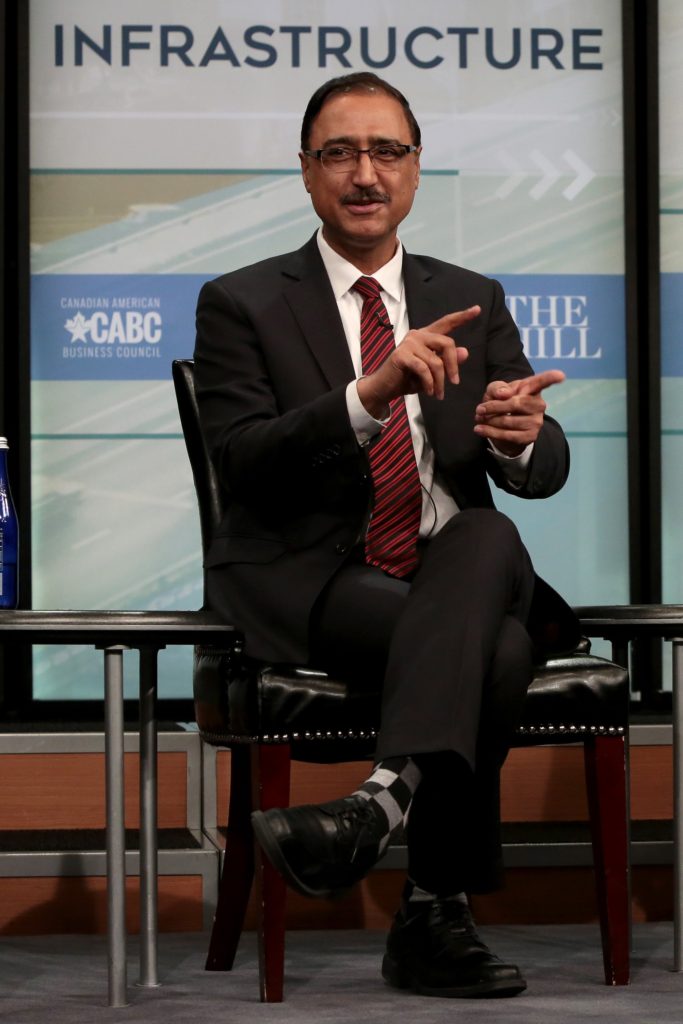
Something semi-remarkable quietly occurred this week on Capitol Hill amid relentless Russia developments and rancour about everything from the Republican health-care bill failure to the confirmation prospects of President Donald Trump’s Supreme Court nominee.
At an event on infrastructure modernization hosted by The Canadian American Business Council and The Hill, two members of Congress from opposite sides of the aisle not only sang one another’s praises, but expressed optimism that a massive infrastructure bill will win bipartisan support this year and pass both the House of Representatives and the Senate.
Could infrastructure be shaping up to be the salve to heal the wounds currently festering on Capitol Hill? And is there a Canadian angle to the solution?
Some sceptics are doubtful and predictions, obviously, have proven cheap in recent months after Trump stunned pundits and pollsters alike by winning the White House. But Rep. John Delaney (D-MD) and Rep. Bill Shuster (R-PA), two of Congress’s transportation leaders, were insistent Wednesday that both sides see the urgent need to repair and rebuild the country’s crumbling roads, bridges and other public works – and emphasized that President Trump, especially now, needs a legislative victory. The $1 trillion infrastructure package might provide just such a win.
Delaney argued the effort should start in the Senate following the crushing defeat suffered by House Republicans on health care, and advised Trump to reach out to Senate Minority Leader Chuck Schumer to get the ball rolling. Schumer and a group of Democrats, after all, have already introduced their own $1 trillion infrastructure package.
Bill Shuster, chairman of the transportation and infrastructure committee, agreed with Delaney – and also lauded his Democratic colleague as one of the brightest minds in Congress, about 10 minutes after Delaney had paid him similar compliments.
There’s widespread speculation inside the beltway that the president could be preparing to present an infrastructure bill much sooner than expected. Construction-related stocks from firms such as John Deere, Caterpillar and Vulcan Materials have climbed in anticipation of an accelerated timetable for the bill.
There may be lessons from Canada for American legislators. Canada’s infrastructure and communities minister, Amarjeet Sohi, was at this week’s event to share with Americans how their neighbour to the north is using private/public partnerships to repair and rebuild its own infrastructure.

In the U.S., Democrats and Republicans are divided on how to tackle infrastructure. Democrats want to see direct public money for transportation, for example, while Republicans want to leverage private-sector cash.
In Canada, Sohi said, the governing Liberals are doing both. The government is preparing to establish the multi-billion-dollar Canada Infrastructure Bank this summer. It’s set aside CDN$15 billion in federal funds for the institution over the next 11 years, plus an added $20 billion in capital via equity or debt.
Sohi said the bank will be able to bring together myriad forms of capital, including government dollars, private cash and pension funds, to build large projects more quickly than with public money alone. In essence, the projects will be a variation of public-private partnerships, already commonly used in Canada to build infrastructure. Private capital is looking for investments, he pointed out, and governments need money, so why wouldn’t they work together?
Another Canadian delved deeper. David Pennington, managing director of BMO Capital Markets, said there’s no single ideal formula for P3s, but added it’s important to select the proper structure for the project at hand. A courthouse, for example, that generates no revenue, would need a different P3 structure than toll highways, which can generally pay for themselves. He also noted that Canadian companies are already bidding on, and have won, contracts on American infrastructure projects – and will continue to help the U.S. sate its $1 trillion infrastructure appetite.
The infrastructure stakeholders at the CABC-The Hill event were rapt, not just by the notion of bipartisan co-operation possibly looming on the horizon, but as they listened to Canadians who are already dealing with best practices on infrastructure and forging vital public-private partnerships. Perhaps the secret sauce in U.S. infrastructure efforts in the months ahead is Canadian wisdom.
Photo: Shutterstock.com
Do you have something to say about the article you just read? Be part of the Policy Options discussion, and send in your own submission. Here is a link on how to do it. | Souhaitez-vous réagir à cet article ? Joignez-vous aux débats d’Options politiques et soumettez-nous votre texte en suivant ces directives.






